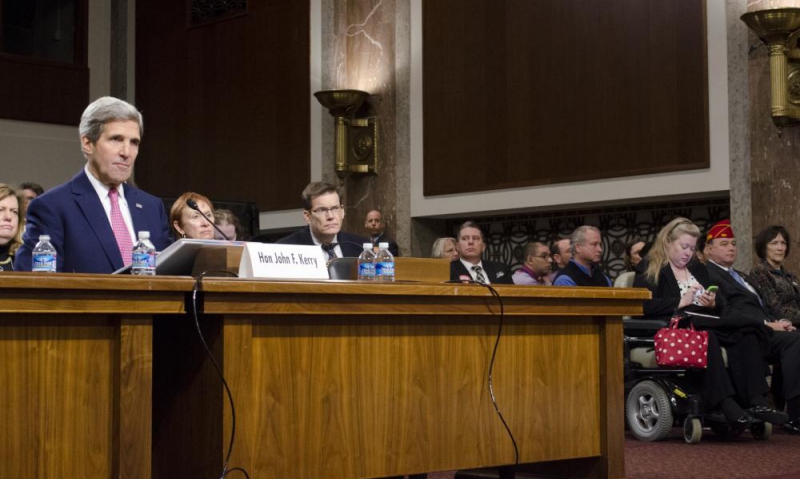
Secretary of State assures Senate that ratifying the international treaty would have no impact on America’s sovereignty or its disability laws.
American Legion National Commander Daniel M. Dellinger attended a Nov. 21 congressional hearing in Washington that examined arguments for and against ratifying the United Nations Convention on the Rights of Persons with Disabilities (CRPD).
Legislative Director Louis Celli Jr. and other Legion national staff also attended the Senate Foreign Relations Committee hearing that featured Secretary of State John Kerry as a key witness.
In his opening remarks, Committee Chairman Robert Menendez, D-N.J., thanked Dellinger and The American Legion for supporting the “Disabilities Treaty”. Kerry, a member of American Legion Post 63 in Salem, N.H., also thanked the Legion and other veterans service organizations.
Menendez said, “Let us not forget what this treaty means to veterans.” He noted 15 letters of support received from 15 veterans service organizations, including The American Legion. “I’d like to recognize the national commander of the American Legion, Dan Dellinger, who is with us here today. Everyone who supports the treaty is pleased with the resolution The American Legion passed in August at your National Convention, and we thank you.”
The Legion resolution argued that the United States must ratify the “Disabilities Treaty” because it embodies the principles of the Americans with Disabilities Act (ADA), “and reinforces our leadership in the promotion of opportunities for disabled veterans, servicemembers, and their families with disabilities to travel, study, work and serve in the world community....”
The ADA prohibits discrimination against people with disabilities in employment, transportation, public accommodation, communications and governmental activities.
In his testimony, Kerry made it clear to the committee that ratification of the CRPD would not require one single change to current U.S. law. America has already taken care of its disabled population with passage of the ADA in 1990. But the treaty is needed, Kerry said, because many other countries have no laws in place like the ADA, which puts their disabled populations at considerable disadvantage.
“The ratification of the Disabilities Treaty will advance core American values,” Kerry said. “It will expand opportunities for our citizens and our businesses, and it will strengthen American leadership. And I am still convinced that we give up nothing, but we get everything in return.”
Toward the end of his remarks, Kerry gave several specific examples of improvements that would be made worldwide as a result of the treaty’s ratification: the installation of flashing signal lights, tactile warning strips, and other devices used to ensure safer environments for the disabled.
“This treaty is not about changing America,” Kerry said. “It is about changing the world.”
Responding to questions from several committee members, Kerry said it was true that the Disabilities Treaty was not a matter of national security, but a matter of “national interest” and about one billion people worldwide who suffer from disabilities.
Ratification of the treaty would have “no impact whatsoever on the sovereignty of the United States,” Kerry said. The treaty would have “no reach...no power to enforce” as far as America is concerned. On the other hand, it would require other countries to make substantial changes to infrastructure and services to better-support their disabled populations.
Corker expressed concern among some members of Congress that the treaty could have negative impacts on U.S. domestic policies. But he made it clear that “No one here disagrees with advancing this cause.”
Kerry affirmed that abiding by the treaty’s conditions required no new U.S. legislation, and that any compliance with the CRPD’s provision would always be subservient to federal law. He also said the treaty creates no right to abortion, and has no impact on the rights of parents to conduct home schooling.
Once ratified, the treaty would establish a Committee on the Rights of Persons with Disabilities with a maximum of 18 members. Kerry said the most the committee could do, as far as influencing U.S. disability policy, would be to “make a suggestion.” He said the U.N. committee ‘has no ability to create international law.”
Although America leads the way with its ADA laws, Kerry said it is important for the Senate to ratify the CRPD because of a “whole series of things it compels other countries to do.... We have already done it.”
- Legislative

